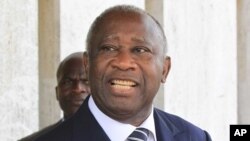Ivory Coast's incumbent government says it is not intimidated by economic sanctions meant to force it from power. The internationally recognized winner of Ivory Coast's presidential vote believes those sanctions will eventually contribute to the incumbent government's collapse.
The European Union is increasing economic pressure on incumbent president Laurent Gbagbo by freezing the assets of Ivory Coast's main cocoa-ports, its state oil firm, its main energy utility, its national broadcaster, and three banks.
European leaders say those firms help to fund what they call Gbabgo's illegitimate government. In a written statement, the European Union says state-run television is guilty of "public incitement to hatred and violence" through a campaign of disinformation about November's presidential election.
The European Union, the United Nations, the African Union, and the United States all say former prime minister Alassane Ouattara won that vote. But Mr. Gbagbo is refusing to give up power, saying he won re-election because his allies on the country's constitutional counsel annulled enough Ouattara votes to put Gbagbo ahead.
The European Union action against Gbagbo follows a U.S. Treasury freeze of his assets and a ban on Americans doing business with his government. West Africa's central bank says it is blocking Gbagbo's access to Ivorian assets, giving that power instead to Ouattara.
Gbagbo spokesman Ahoua Don Mello says the international community is mistaken if it believes sanctions will weaken Gbagbo's hold on power.
Mello says Western leaders often make this mistake. The world today does not stop at Europe or America. He says Ivorians can go anywhere in Africa, South America or Asia to get what they need. So if Europe and the United States no longer want Ivory Coast, Mello says those countries will lose because Ivorians can shop elsewhere, but the world must come to Ivory Coast for its cocoa.
Mello says the central bank action against Gbagbo will only hurt the regional economy.
Mello says Ivory Coast put its money in the central bank, so no one can stop the government from using its own resources. He says the central bank needs Ivorian revenue, so if it excludes Ivory Coast, Mello says the bank will obviously fail.
But the bank is not excluding Ivory Coast, just Gbabgo. Eight countries use the West African CFA Franc, whose value is pegged to the Euro. That gives the West Africa central bank stability, while Gbagbo's government can no longer float a government bond, for example, to raise revenue.
Ouattara supporters believe economic sanctions will eventually weaken Gbagbo's government.
"I think Mr. Gbagbo will listen to the world," said Jean Marie Gervais, Ouattara's foreign minister. "And he will not have any possibility of using his own means. He will see that the entire world is against what he is doing today. We can not see it by now, but it is on, and I am sure he will not be able to stand the heat when the time comes."
Ouattara is moving to capitalize on near-unanimous international support by calling for foreign petroleum and cocoa companies in Ivory Coast to stop paying taxes. It is a request with a costly threat. Ouattara says he will make sure that any export taxes paid now to the Gbagbo government are paid a second time to an eventual Ouattara government.
Incumbent Ivory Coast Government says Economic Sanctions Will Fail











